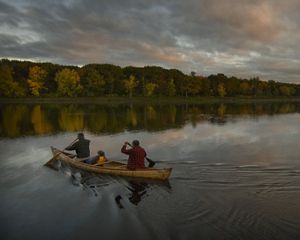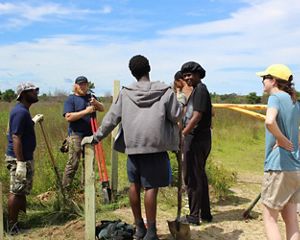
Media Contacts
-
Jeremy Cluchey
Director of Public Affairs, Maine
Email: jeremy.cluchey@tnc.org
Hancock County, Maine – The Nature Conservancy in Maine announced the addition of 2,925 acres to their Spring River – Narraguagus Forest Preserve north of Tunk Mountain in the Narraguagus River watershed, expanding the property to more than 26,000 acres. The property includes important forest, wetland, wild lowbush blueberry and grassland habitats and this new addition ensures permanent protection along both banks of almost five miles of the West Branch of the Narraguagus River.
Together with the adjacent Donnell Pond Unit of Maine Public Reserved Lands and properties conserved by the Maine Department of Inland Fisheries and Wildlife, Downeast Salmon Federation, Maine Coast Heritage Trust, and Frenchman Bay Conservancy, TNC’s Preserve is a key component of a landscape that includes 46,000 contiguous acres of conservation lands in eastern Hancock County.
“This new property fills a gap in a large landscape conserved by The Nature Conservancy and our partners,” said Mark Berry, Forest Program Director for The Nature Conservancy in Maine. “This area is a critical pathway for plants and animals to move across the landscape, and protects important habitat for fish and other aquatic species in the Narraguagus River watershed.”
“None of this would be possible without our generous donors and longstanding valued partners like the U.S. Fish and Wildlife Service, Maine Coast Heritage Trust, and Downeast Salmon Federation,” added Berry. “We are very fortunate to have such a community of partners and supporters investing in Maine’s Future.”
“The Narraguagus River is home to brook trout, endangered Atlantic salmon, and other sea-run fish species, as well as human communities who have depended on the connection between the ocean and river for thousands of years,” said Molly Payne Wynne, Freshwater Program Director for The Nature Conservancy in Maine. “As one of the most ecologically important watersheds in the Eastern US, land conservation here advances the health of the river, building upon habitat restoration work that partners, like Project SHARE, have been implementing for decades, in addition to the recent effort by the Town of Cherryfield, Downeast Salmon Federation, Maine Coast Heritage Trust, Atlantic Salmon Federation, TNC, and many conservation partners to remove the Cherryfield dam – the last remaining barrier to fish passage on the main stem of the Narraguagus River.”
A community meeting was held in Cherryfield on January 14th to start gathering ideas for improvements to the Cable Pool Park adjacent to the site of the current dam, and as an opportunity for questions.
TNC maintains most of the Spring River Narraguagus Forest as an ecological reserve, where the land is shaped by natural processes such as wind, ice, and other weather events. Beyond providing valuable wildlife habitat, ecological reserves are important to scientists studying the growth of forests and how they respond, in the absence of timber harvesting, to challenges such as climate change, forest pests, diseases, and airborne pollution. Some areas of the property may also be managed to retain important wildlife habitats and to provide opportunities for access to traditional cultural resources.
The preserve is open for fishing, hunting and other recreational activities in accordance with state game laws and TNC policies and includes a club-maintained ATV trail. Visitors should be aware there is limited recreational infrastructure, roads are seasonal, and overnight camping and pets are not permitted in order to protect natural processes and wildlife.
The Nature Conservancy is a global conservation organization dedicated to conserving the lands and waters on which all life depends. Guided by science, we create innovative, on-the-ground solutions to our world’s toughest challenges so that nature and people can thrive together. We are tackling climate change, conserving lands, waters and oceans at an unprecedented scale, providing food and water sustainably and helping make cities more resilient. The Nature Conservancy is working to make a lasting difference around the world in 83 countries and territories (39 by direct conservation impact and 44 through partners) through a collaborative approach that engages local communities, governments, the private sector, and other partners. For more news, visit our newsroom or follow The Nature Conservancy on LinkedIn.



